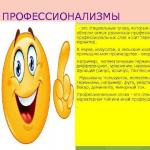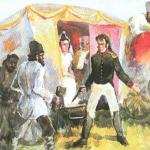Professionalism of economists Examples. Examples of professionalism in literature and colloquial speech. Professionalism words in various branches of activity. In the psychology of professionalism and professional activities
The concept and features of professional vocabulary
Words related to professional vocabulary, named by professionalism. Halperin interpreted professionalism as "... Words associated with the production activities of people united by one profession or native classes." In his opinion, professionals are correlated with terms. The latter appear to determine newly emerging concepts as a result of scientific discoveries and technical progress. Professionalism in a new way indicate already known concepts, usually objects and labor processes (activities). Professionalism differ from the terms in that the terms are the specialized part of the literary and book vocabulary, and professionalism is a specialized part of non-leaturated spoken vocabulary. The semantic structure of professionalism is darled with a figurative representation in which the highlighted features can be quite random and arbitrary. The emergence of professionalism is the semantic specialization - narrowing the meaning of the word.
As an example, you can bring speech teachers. In their vocabulary, they dominate such words such as, the lesson, curriculum, an extracurricular event, a technological map of the lesson, etc.
Professionalism - These are words and phrases, which are currently not officially recognized designations of special concepts.
Professionalism Usually appear in cases where the need arises to designate a kind of any concept, subject, and exist as professionalism as long as they are not officially recognized and then they are already beginning to be called the terms.
Professionalism
Words and expressions peculiar to the speeches of people of various professions and serving various spheres of professional activity, but not become commonly used. P., unlike terms, are considered "semi-official" words (lexemes) who have no strict scientific nature, for example: organic matter - organic chemistry, ram - car steering wheel. In the artistic literature P., like another vocabulary, which has a limited sphere of use (spatrical elements (spacious), dialectisms, zaga messenger), are used as one of the characteristics of the characteristic characteristic, for example: "We are not talking storms, but a storm" (in . Vysotsky). See also vocabulary.
Dictionary of literary terms. 2012
See also interpretations, synonyms, the meanings of the word and what are professionalism in Russian in dictionaries, encyclopedias and reference books:
- Professionalism in the big encyclopedic dictionary:
words and expressions peculiar to any professional group (eg, "on-mountain" in speech ... - Professionalism in the big Russian encyclopedic dictionary:
Professionalism, words and expressions, peculiar to K.L. prof. Groups (eg, "on-mountain" in speech ... - Professionalism
- Words and expressions, peculiar to the speeches of representatives of a profession or the sphere of activity-I STI, penetrating into about-taper consumption (we will give ... ... - Professionalism in the modern explanatory dictionary, BSE:
words and expressions peculiar to any professional group (eg, "on-mountain" in speech ... - Tale
1) The type of narration based on styling the speech of that Hero, who acts as a narrator. The narration in C. is conducted on behalf of ... - Spacious in the dictionary of literary terms:
- reduced variety of spoken language, for which the use of vocabulary abroad is characteristic of the literary norm. Spatrical words and turns can ... - VOCABULARY in the dictionary of literary terms:
- (from Greek. Lexis - speech; The method of expression, syllable; turnover, word) - a set of all the words of the language, his vocabulary. IN … - JARGON in the dictionary of literary terms.
- Dialectisms in the dictionary of literary terms:
- Words and expressions inherent in folk speech, local guess (Koraviki - shoes, Bases - yard, Biryuk - Lonely and sullen ... - Graphic identification in the Big Soviet Encyclopedia, BSE:
identification in forensic, identification of a person in writing (handwriting), i.e., the establishment of the artist (author) by a comparative study of signs of the handwriting, displayed in ... - WORD in the linguistic encyclopedic dictionary:
- the main structural-semantic unit of a language that serves to naming objects and their properties, phenomena, reality relationship, which has a combination of semantic, phonetic and ... - VOCABULARY in the linguistic encyclopedic dictionary:
(from g * speech. Lexikos - related to the Word) - a set of words of the language, his vocabulary. This term is used in relation to ... - Special vocabulary in the dictionary of linguistic terms:
Words and phrases, which call items and concepts related to various human labor activities, are not commonly used. IN … - PROFESSIONALISM in the popular intelligent encyclopedic dictionary of the Russian language:
-A, m. 1) lesson as a profession. Club lovers of his most gifted figures gradually develops into professionalism (...
 Professionalism are special words that are used in the field of various professions. A significant part of professional words is terminological. In science, art, in agriculture, in industrial production - everywhere there are its terms. For example, mathematical terms: integral, differential, equation, trigonometric functions (sinus, cosine, tangent, etc.). Musicians enjoy naturally musical terms, for example: Fugue, Overture, Chord, Gamma, Becar, Dominant, Minor tone. Professional words are a special vocabulary characteristic of a particular profession. .
Professionalism are special words that are used in the field of various professions. A significant part of professional words is terminological. In science, art, in agriculture, in industrial production - everywhere there are its terms. For example, mathematical terms: integral, differential, equation, trigonometric functions (sinus, cosine, tangent, etc.). Musicians enjoy naturally musical terms, for example: Fugue, Overture, Chord, Gamma, Becar, Dominant, Minor tone. Professional words are a special vocabulary characteristic of a particular profession. .

 It is worth a detailed on what professionalism is in Russian. Often, such words include ferrous expressions. The informal nature of the lexeme says that they are not used everywhere. Their use may be limited to a narrow circle of people: owned by one specialty, qualifications working in one organization. Often the circle of concepts with time becomes wider. Almost people of any profession have their own set of professionalism. This is due to the need to clearly designate all processes and phenomena in working life, many of which often do not have definitions. Associations with household concepts are formed. Often for a person who is not dedicated to the subtlety of a particular profession, a confusion may arise when meeting with words from professional vocabulary. In real life, they can designate completely different objects.
It is worth a detailed on what professionalism is in Russian. Often, such words include ferrous expressions. The informal nature of the lexeme says that they are not used everywhere. Their use may be limited to a narrow circle of people: owned by one specialty, qualifications working in one organization. Often the circle of concepts with time becomes wider. Almost people of any profession have their own set of professionalism. This is due to the need to clearly designate all processes and phenomena in working life, many of which often do not have definitions. Associations with household concepts are formed. Often for a person who is not dedicated to the subtlety of a particular profession, a confusion may arise when meeting with words from professional vocabulary. In real life, they can designate completely different objects.
 Problems of professionalism is one of the problems - this is a lack of understanding of the professionalism of people who do not belong to the specific type of profession. Many of these expressions are absent in the dictionaries. And those that are found in vocabulary and terminological publications, with difficulty delimited from the terms themselves and the spacious. The inability to find the exact definition of professionalism can cause confusion even among the representatives of the professions. And because of this, errors in work, failures. Informational barriers arise when communicating workers and qualified specialists with their leadership. For employees, special expressions are more familiar in their speech, but many managers are the meaning of their unfamiliar. As a result, some extraction of groups of workers of different levels appear, conflicts may arise.
Problems of professionalism is one of the problems - this is a lack of understanding of the professionalism of people who do not belong to the specific type of profession. Many of these expressions are absent in the dictionaries. And those that are found in vocabulary and terminological publications, with difficulty delimited from the terms themselves and the spacious. The inability to find the exact definition of professionalism can cause confusion even among the representatives of the professions. And because of this, errors in work, failures. Informational barriers arise when communicating workers and qualified specialists with their leadership. For employees, special expressions are more familiar in their speech, but many managers are the meaning of their unfamiliar. As a result, some extraction of groups of workers of different levels appear, conflicts may arise.
 Professionalism in Russian has been little studied, researchers - Syaskovs are trying to avoid this phenomenon. The emergence of such words is spontaneously, and it is difficult to find certain boundaries for them and give a clear designation. There are some editions of the training character in which experts try to give a list of professionalism. Such dictionaries will help the student and students in their future working activities: to quickly enter the course of the case and understand colleagues, do not experience difficulties in oral communication with narrow specialists.
Professionalism in Russian has been little studied, researchers - Syaskovs are trying to avoid this phenomenon. The emergence of such words is spontaneously, and it is difficult to find certain boundaries for them and give a clear designation. There are some editions of the training character in which experts try to give a list of professionalism. Such dictionaries will help the student and students in their future working activities: to quickly enter the course of the case and understand colleagues, do not experience difficulties in oral communication with narrow specialists.


 The terms are those rmin (from lat. Terminus - limit, border) - word or phrase, which is the name of some concept of some area of \u200b\u200bscience, technology, art and so on. Terms serve as specializing, restrictive designations characteristic of this sphere of objects, phenomena, their properties and relationships. Unlike the words of general vocabulary, which are often meaningful and carry emotional color, terms within the scope of application are unambiguous and expression. The terms exist within a certain terminology, that is, enter into a specific lexical system of the language, but only through the specific terminological system. Unlike the words of the general language, the terms are not associated with the context. Within this system of concepts, the term ideally should be unequivocal, systematic, stylistically neutral (for example, "phonam", "sinus", "surplus value"). According to the author of the textbook "Terminov Studies" S. V. Grineeva-Grinevich, referring to O. S. Akhmanova's opinion, the basic composition of the terminological list of European languages \u200b\u200b"may well be exhausted by noun". Grineev-Grinevich recognizes the existence of a "excellent opinion", according to which some verbs can also be attributed to the terms, as well as adjectives and adverbs, but rejects this point of view as an insolvent. Hence, its refined definition of the term as a "nominative lexical unit (words or phrase) taken to accurately naming concepts." Terms and Netherm (words of the nationwide language) can go to each other. The terms are subject to word-forming, grammatical and phonetic rules of this language, are created by the terminology of the words of the nationwide language, borrowing or calculating foreign-speaking thermal elements. In some cases, with such a word in the terminology of various subject areas arises homonymy: so, for example, the word "ligature" borrowed from Latin (Lat. Ligatura) in metallurgy has the meaning of "alloys for doping", in surgery - "thread used when dressing Blood vessels ", in the theory of music - a grapetea, in which several simple" bottled "musical signs were recorded in a single sign.
The terms are those rmin (from lat. Terminus - limit, border) - word or phrase, which is the name of some concept of some area of \u200b\u200bscience, technology, art and so on. Terms serve as specializing, restrictive designations characteristic of this sphere of objects, phenomena, their properties and relationships. Unlike the words of general vocabulary, which are often meaningful and carry emotional color, terms within the scope of application are unambiguous and expression. The terms exist within a certain terminology, that is, enter into a specific lexical system of the language, but only through the specific terminological system. Unlike the words of the general language, the terms are not associated with the context. Within this system of concepts, the term ideally should be unequivocal, systematic, stylistically neutral (for example, "phonam", "sinus", "surplus value"). According to the author of the textbook "Terminov Studies" S. V. Grineeva-Grinevich, referring to O. S. Akhmanova's opinion, the basic composition of the terminological list of European languages \u200b\u200b"may well be exhausted by noun". Grineev-Grinevich recognizes the existence of a "excellent opinion", according to which some verbs can also be attributed to the terms, as well as adjectives and adverbs, but rejects this point of view as an insolvent. Hence, its refined definition of the term as a "nominative lexical unit (words or phrase) taken to accurately naming concepts." Terms and Netherm (words of the nationwide language) can go to each other. The terms are subject to word-forming, grammatical and phonetic rules of this language, are created by the terminology of the words of the nationwide language, borrowing or calculating foreign-speaking thermal elements. In some cases, with such a word in the terminology of various subject areas arises homonymy: so, for example, the word "ligature" borrowed from Latin (Lat. Ligatura) in metallurgy has the meaning of "alloys for doping", in surgery - "thread used when dressing Blood vessels ", in the theory of music - a grapetea, in which several simple" bottled "musical signs were recorded in a single sign.
Professionalism
words or expressions characteristic of a speech of a professional group. Used to recreate the appropriate color, for speech characteristics of characters.
Example:
flask (in the speech of sailors - half an hour)
gustopsy (in the speech of dog breeders - the name of the quality of the dog)
basement (in the speech of polygraphists - an article that occupies the bottom of the newspaper strip)
"Professionalism is a circle of conditional expressions of any profession that have limited use. Inappropriate, there may be unmotivated consumption of them to reduce the artistic advantage of the text" (L.I. Timofeev).
Terminological dictionary-thesaurus for literary studies. From Allegoria to Yamba. - M.: Flint, Science. N.Yu. Rusova. 2004.
Watch what is "Professionalism" in other dictionaries:
Professionalism - Words and expressions, peculiar to any professional group (eg, on the mountain in the speech of miners) ... Big Encyclopedic Dictionary
Professionalism - Professionalism of the words and expressions, peculiar to the speeches of representatives of a profession or the scope of activity penetrating into overhang (mainly in oral speech) and usually speakers as spatrical, emotionally ... ... Linguistic Encyclopedic Dictionary
professionalism - Words and expressions peculiar to some professional group (for example, "on the mountain" in the speech of mines). * * * Professionalism of professionalism, words and expressions, characteristic of some professional group (eg, "on the mountain" in ... ... encyclopedic Dictionary
Professionalism - Words or expressions characteristic of a speech of one or another prof. Groups. P., along with terms and agencies, constitute the discharge of special vocabulary. P. Conversation words, stylistically reduced, designate mostly concepts associated with labor processes ... Russian Humanitarian Encyclopedic Dictionary
professionalism - The discharge of words representing specific terminology in the "natural" speech of representatives of a certain profession. Creating artistic images of these people, writers turn to this type of "passive" vocabulary to give the speech of their ... ... Literary encyclopedia
professionalism - Words and expressions, characteristic of people of different professions and serving various areas of professional activity, but not become commonly used. P., unlike terms, are considered semi-deform words (lexems), not ... ... Dictionary of literary terms
Professionalism - Words and expressions peculiar to any professional group (eg, in investigators, operational workers to "split" to encourage recognition, "confessions"). Used in the author's expertise ... Criminalist encyclopedia - Professionalism, words or expressions used in a certain professional environment. Together with terms and professional jargonisms (cf. jargon) are included in the reservoir of special vocabulary. Between these three varieties of special vocabulary ... ... Literary Encyclopedic Dictionary
In addition to common words in Russian, there are words used much less frequently. These include various jargonis and turnover used in professional speech. Professionalism are words that use people of a profession, or simply related to a certain specialization. But, unlike terms, they are not adopted as official concepts and are not applicable in scientific activities.
Features of the term
It is worth a detailed on what professionalism is in Russian. Often, such words include ferrous expressions. The informal nature of the lexeme says that they are not used everywhere. Their use may be limited to a narrow circle of people: owned by one specialty, qualifications working in one organization. Often the circle of concepts with time becomes wider.
Almost people of any profession have their own set of professionalism. This is due to the need to clearly designate all processes and phenomena in working life, many of which often do not have definitions. Associations with household concepts are formed. Often, for a person who is not dedicated to the subtlety of a particular profession, confusion may occur when a meeting with words from in real life, they can designate completely different objects.

For example, the word "peasants" in legal speech denote the witnesses of the crime, not residents of the village.
Characteristics and application
Another characteristic feature of professionalism is an emotional painting and expression. Many are used to designate negative phenomena, production errors. It is noticeable to their similarity with the spaticrous expressions: in some cases, it is almost impossible to distinguish between these concepts. They are always formed in oral speech. In some cases, the word has a terminological analog that is not used due to the complexity of pronunciation, the bulkness of the word.
Many examples can be brought from railway professions. Each type of transport here has its own designation, sometimes consisting of abbreviations and numbers. It is quite difficult to use them in speech, so replacement concepts appear in communication of railway workers.

For example, a tank with 8 axes is called "cigar", and the diesel locomotive of the road employees are called "carcass". There are similar examples in aviation: An-14 aircraft called "bee".
The designations are not only technical devices, but also separate professions and positions. Dresinlera call drivers of travel machines. Some of the words-professionalism are distorted foreign designations: Latin's reading without complying with the rules of pronunciation (for example, "Designer" is a designer).
Examples from different professions
In some works of fiction, writers also use professionalism. This is necessary for the image of a certain category of people, transferring emotions and for characters' dialogs. Many professionals do not even notice how they use the words of this vocabulary in their speech. They have teachers, sports coaches, economists and designers. In the legal and law practice, the phrase "sew case" means "investigation with a bias on charge." Musicians and music teachers have a "major mood" expression, carrying, rather, a positive shade. It is rich in professionalism and language of health workers, where complex names of diagnoses are replaced by ironic, simplified words.

"Bareshnik" is called a patient infected with hepatitis B and C, "Meretsuha" is called flickering arrhythmia. The main purpose of such words in this case is to make it a shorter and tank, and speed up the process of assisting patients.
Consumption in speech
Professionalism in Russian has little studied, language researchers are trying to avoid this phenomenon. The emergence of such words is spontaneously, and it is difficult to find certain boundaries for them and give a clear designation. There are some editions of the training character in which experts try to give a list of professionalism. Such dictionaries will help the student and students in their future working activities: to quickly enter the course of the case and understand colleagues, do not experience difficulties in oral communication with narrow specialists.
Problems of professionalism
One of the problems is a misunderstanding of professionalism by people who do not belong to a specific many of these expressions are absent in the dictionaries. And those that are found in vocabulary and terminological publications, with difficulty delimited from the terms themselves and the spacious. The inability to find the exact definition of professionalism can cause confusion even among the representatives of the professions. And because of this, errors in work, failures. Informational barriers arise when communicating workers and qualified specialists with their leadership. For employees, special expressions are more familiar in their speech, but many managers are the meaning of their unfamiliar. As a result, some extraction of groups of workers of different levels appear, conflicts may arise.




